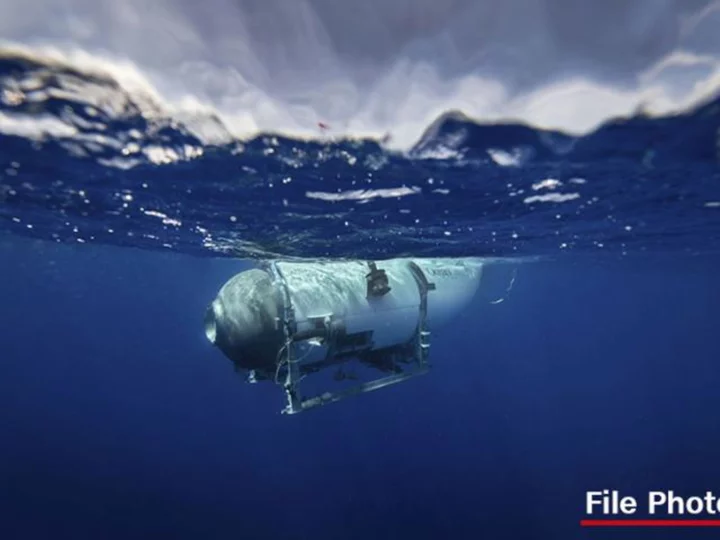The amount of oxygen on a missing submersible with five people on board is becoming a vital issue, some experts say, as more advanced equipment is rushed to the North Atlantic Ocean in a complex international search operation now at its most critical juncture.
The submersible, known as "Titan," begins each trip to explore the wreckage of the Titanic with an estimated 96 hours of life support and has been missing since Sunday morning, setting up Thursday morning as a key target for finding the vessel and those on board.
Banging noises detected on Tuesday and Wednesday from underneath the water in the massive search area have provided hope for survivors -- but it's like finding a needle in a haystack and time is of the essence, experts say.
Inside the 21-foot submersible, with rudimentary controls and no room for its passengers to stretch out, the crew would have had "limited rations" of food and water, officials have said.
"We have to remain optimistic and hopeful," Capt. Jamie Frederick, the response coordinator for the First Coast Guard District said during a news conference Wednesday.
As aircraft perform searches from above and remotely operated vehicles probe underwater, the number of assets in the search operation is expected to double in the next day or two, Frederick said Wednesday.
A Canadian Coast Guard boat with sonar capabilities, the John Cabot, arrived on scene Wednesday to join the search. The US Navy is also sending a lift system that can pull heavy undersea objects from up to a depth of 20,000 feet to help with recovery if the submersible is found.
"We'll continue to put every available asset that we have in an effort to find the Titan and the crew members," Frederick said.
The search area for the missing submersible stretches about two times the size of Connecticut on the surface and goes down as deep as two-and-a-half miles, according to Frederick.
"It's going to be almost impossible. We need a miracle -- but miracles do happen," oceanographer and water search expert David Gallo told CNN.
When banging noises were heard in the search area, crews redirected remotely operated vehicles to explore their origin, according to the US Coast Guard. The underwater sounds detected by sonar devices on Tuesday first came every 30 minutes and were heard again four hours later, according to an internal US government memo update on the search.
However, it remains unclear whether the noises are from the missing submersible, Frederick said. Naval experts were analyzing recordings of the sounds to determine their origin. "I can't tell you what the noises are," he said.
Various environmental factors in the ocean are likely complicating efforts to identify the noises, said Rick Murcar, who is the international training director for the National Association of Cave Divers.
Currents in the water can deflect the sound so that it appears like it is coming from miles away from where the actual source is, Murcar explained.
He likened the effort to locate the noise to trying to pinpoint a specific snare drum in a stadium full of cheering fans and other instruments.
The Titan, operated by OceanGate Expeditions, lost contact with its mother ship Sunday about 1 hour and 45 minutes its dive to explore the Titanic's wreckage -- a trip the company offers for prices starting at $250,000, an archived version of the company's website shows.
Aboard the Titan are OceanGate CEO and founder Stockton Rush, a source with knowledge of the mission plan said, along with British businessman Hamish Harding, Pakistani billionaire Shahzada Dawood and his son Suleman Dawood, and French diver Paul-Henri Nargeolet, according to relatives and social media posts. Officials have not publicly named those aboard.
Searchers are "very aware of the time sensitivity around this mission," said a representative of the company that owns the Polar Prince, the support vessel that carried Titan to the site of the Titanic shipwreck.
Harsh conditions on the submersible
As aircraft, ships, sonar buoys and robots comb through the ocean, experts warn that conditions are likely dire aboard the 23,000-pound submersible -- especially if it's still deep underwater.
Ret. Navy Capt. David Marquet, a former submarine captain, described Wednesday what he imagines the five passengers are experiencing in the Titan submersible.
Titan's passengers are likely thirsty and hungry, and very uncomfortable, Marquet told CNN's Jake Tapper.
"They're freezing cold. The water entirely surrounding the ship is at freezing or slightly below. When they exhale, their breath condenses. There's frost on the inside of the parts of the submarine," Marquet said. "They're all huddled together trying to conserve their body heat. They're running low on oxygen and they're exhaling carbon dioxide."
He said the submersible has a "limited ability" to absorb the exhaled carbon dioxide, which at high levels could trigger headaches, confusion and nausea.
"The oxygen and the carbon dioxide and the freezing are what they got to hold onto as long as possible to give the rescuers the time they need," Marquet added.
Those onboard will need to conserve energy, said Joe MacInnis, a physician and renowned diver who's made two trips to the Titanic wreck.
"Resting, breathing as little as possible, and trying to keep calm -- that is the most important thing," he told CNN early Wednesday.
The last communication between the vessel and its mother ship, the Polar Prince, came in at 11:47 a.m. Sunday. With no GPS underwater, the submersible is only guided by text messages from the surface ship.
Josh Gates, host of Discovery Channel's "Expedition Unknown," went on a test dive on OceanGate's Titan in 2021 and called news of the missing submersible "surreal" and "haunting."
"In the course though of going out on Titan, and diving down inside of it, it just became clear to us at that time that there was a lot that needed to be worked out with the sub," Gates told CNN's Anderson Cooper Wednesday. "A lot of the systems worked but a lot of them really didn't. We had issues with thrusters and issues with computer control and things like that. Ultimately, it was a challenging dive."
Gates and his team ultimately decided not to go through with filming a segment on the vessel, Gates said.
"We were inside Titan for two or three hours and there were a lot of things that weren't really ready for prime time, it seemed," he said, adding that he couldn't get comfortable with the Titan at that time.
OceanGate declined safety review of Titan submersible, industry leader says
The disappearance of Titan and the international dash to find it have put the company that operated it under the microscope.
CNN has learned of at least two former OceanGate employees who expressed safety concerns about the vessel's hull years ago, including the thickness of the material used and testing procedures. The 23,000-pound craft is made of highly engineered carbon fiber and titanium.
OceanGate Expeditions strayed from industry norms by declining a voluntary, rigorous safety review of the vessel, according to an industry leader.
If OceanGate had pursued a certification review "some of this may have been avoided," Will Kohnen of the Marine Technology Society told CNN on Wednesday.
The company also faced a series of mechanical problems and inclement weather conditions that forced the cancellation or delays of trips in recent years, according to court records.
The scuttled excursions led to a pair of lawsuits in which some high-paying customers sought to recoup the cost of trips they said they didn't take. The complaints alleged that the company overstated its ability to reach the Titanic wreckage.
OceanGate did not respond to the claims in court and could not be reached for comment.
Some expeditions were delayed after OceanGate was forced to rebuild the Titan's hull because it showed "cyclic fatigue" and wouldn't be able to travel deep enough to reach the Titanic's wreckage, according to a 2020 article by GeekWire, which interviewed the company's CEO.









